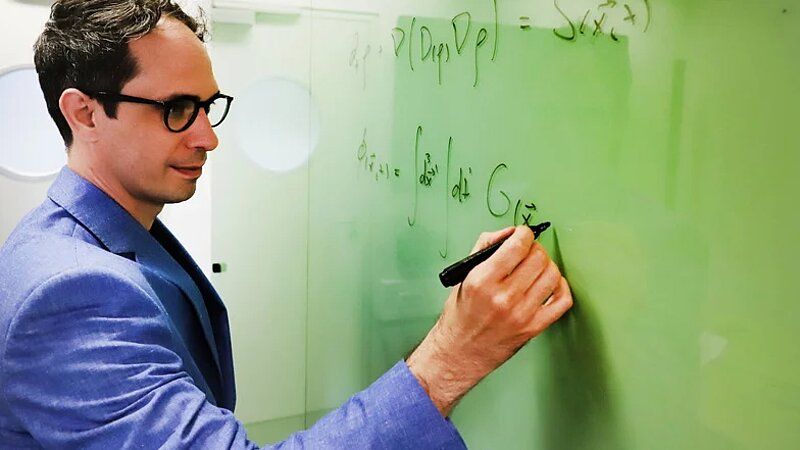What makes us alive? Catalan scientist Otger Campàs believes this question will soon be answered.
Physics and biology are not just two different disciplines in the natural sciences. “They are also two different languages,” explains Otger Campàs. The Catalan researcher came to TU Dresden in 2021 and holds the Chair of Tissue Dynamics. He previously worked at the University of California in Santa Barbara – sun, beach and sea included. What brought him to Saxony? It was to work in the TUD Cluster of Excellence Physics of Life. “Biologists and physicists have been speaking a common language here for a long time,” says the researcher. This enables a new kind of collaboration and unique discoveries.
Campàs grew up in a small town near Barcelona. Even as a teenager, he knew that he wanted to pursue a career in science. “It was clear to me: if I wanted to understand how nature works, I had to study physics.” However, he had no idea what life as a scientist would entail. Research knows no borders. The best jobs are rarely available in the home country. That means leaving parents, siblings and friends behind. He worked in France and for 16 years in the USA. “You see the world, but you pay a high price for it,” he states honestly.
When the offer came from the Cluster of Excellence Physics of Life, he didn’t hesitate for long. “You only get a chance like this once.” He did not come to Dresden alone. His wife, who is both Australian and American, is also a Professor at TU Dresden and their two children attend primary school in Dresden. “Of course it was difficult for all of us to adjust here at first. But now we feel at home in the city.”
According to Campàs, Dresden is one of the top locations for investigating the physics of life. Physicists, biologists, engineers and chemists work closely together in his research group. A total of 15 people belong to the team. Together, they explore the laws of physics in all of us. How does life organize itself within organisms? What rules do molecules, cells and tissue follow? “Our bodies live in a physical world. We have forgotten for too long that it is also physics.” Campàs and his team discovered, among other things, that cells can melt tissues to form an embryo and develop the spinal column. In the end, the tissue solidifies again. Such mechanisms also play a role in other processes in the body, from digit formation to skin regeneration. Another important topic is the growth of tumors. What physical mechanisms play a role here? What favors the formation of metastases? With all this new knowledge, it will be possible to better understand diseases and develop effective therapies in the future.
So, what constitutes life in us? Otger Campàs is convinced that this question will soon be answered. “This is a longstanding open question in Science,” says the researcher. “But here in Dresden, we have the people, the knowledge and the technology to crack the code.” He definitely doesn’t want to miss out on this.
Check out the original article on the Sächsische website.
